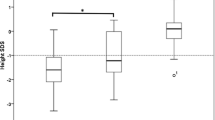Abstract
Purpose
We report a very rare case showing menstrual restoration in severe pan-hypopituitarism many years after cranial irradiation for suprasellar germinoma.
Case
A 30-year-old, almost primarily amenorrheic woman with severe panhypopituitarism presented with cyclic genital bleeding for the previous five months. She had menstruated once, when she was 13 years old. When she was 14 years old, she was diagnosed with a suprasellar germinoma measuring 10 mm in diameter, which led to diabetes insipidus. Cranial irradiation with a total dose of 24 Gy and chemotherapy resulted in complete tumor remission. She developed severe hypopituitarism [luteinizing hormone (LH) = 0.4 mIU/mL, follicle-stimulating hormone (FSH) = 1.7 mIU/mL, and serum estradiol (E2) level < 10 pg/mL]. She had received multiple hormone replacement therapies for many years. When she was 29 years old, she expressed a desire to become pregnant. Serum gonadotropin and E2 levels increased (LH = 5.8 mIU/mL, FSH = 5.9 mIU/mL, and E2 = 58 pg/mL). She conceived with clomiphene therapy, and then delivered a healthy baby. Eight months after parturition, her basal body temperature and serum progesterone levels indicated recovery of ovulatory cycles. Ten months after parturition, she also spontaneously conceived.
Conclusion
Menstrual restoration is very rare in severe panhypopituitarism after cranial irradiation. A relatively low dose of irradiation and small tumor size may have contributed to the recovery of menstruation in our patient.
Similar content being viewed by others
References
Huang TS, Huang LS, Tung CC, Lee SH, Chen FW, Huang SC, et al. Effect of cranial irradiation on hypothalamus and pituitary functions. Taiwan Yi Xue hui Za Zhi. 1989;88:682–8.
Appleman-Dijkstra NM, Kokshoorn NE, Dekkers OM, Neelis KJ, Biermasz NR, Romijn JA, et al. Pituitary dysfunction in adult patients after cranial radiotherapy: systemic review and meta-analysis. J Clin Endocrinol Metab. 2011;96:2330–40.
Bhandare N, Kennedy L, Malyapa RS, Morris CG, Mendenhall WM. Hypopituitarism after radiotherapy for extracranial head and neck cancers. Head Neck. 2008;30:1182–92.
Agha A, Sherlock M, Brennan S, O’Connor SA, O’Sullivan E, Rogers B, et al. Hypothalamic-pituitary dysfunction after irradiation of nonpituitary brain tumors in adults. J Clin Endocrinol Metab. 2005;90:6355–60.
Sathyapalan T, Dixit S. Radiotherapy-induced hypopituitarism: a review. Expert Rev Anticancer Ther. 2012;12:669–83.
Darzy KH, Shalet SM. Hypopituitarism following radiotherapy. Pituitary. 2009;12:40–50.
Ascoli P, Cavagnini F. Hypopituitarism. Pituitary. 2006;9:335–42.
Larsen EC, Muller J, Rechnitzer C, Schmiegelow K, Andersen AN. Diminished ovarian reserve in female childhood cancer survivors with regular menstrual cycles and basal FSH < 10 IU/l. Hum Reprod. 2003;18:417–22.
Letourneau JM, Ebbel EE, Katz PP, Oktay KH, McCulloch CE, Ai WZ, et al. Acute ovarian failure underestimates age-specific reproductive impairment for young women undergoing chemotherapy for cancer. Cancer. 2012;118:1933–9.
Nicosia SV, Matusridley M, Meadows AT. Gonadal effects of cancer therapy in girls. Cancer. 1985;55:2364–7.
Gershenson DM. Menstrual and reproductive function after treatment with combination chemotherapy for malignant ovarian germ cell tumors. J Clin Oncol. 1988;6:270–5.
Viswanathan V, Pradhan KR, Eugster EA. Pituitary hormone dysfunction after proton beam radiation therapy in children with brain tumors. Endocr Pract. 2011;17:891–6.
Darzy KH. Radiation-induced hypopituitarism. Curr Opin Endocrinol Diabetes Obes. 2013;20:342–53.
Littley MD, Shalet SM, Beardwell CG, Robinson EL, Sutton ML. Radiation-induced hypopituitarism is dose dependent. Clin Endocrinol (Oxf). 1989;31:363–73.
Robinson IC, Fairhall KM, Hendry JH, Shalet SM. Differential radiosensitivity of hypothalamo-pituitary function in the young adult rat. J Endocrinol. 2001;169:519–26.
Hall JE, Martin KA, Whitney HA, Landy H, Crowley WF Jr. Potential for fertility with replacement of hypothalamic gonadotropin-releasing hormone in long term female survivors of cranial tumors. J Clin Endocrinol Metab. 1994;79:1166–72.
Pasqualini T, Escobar ME, Domene H, Muriel FS, Pavlovsky S, Rivarola MA. Evaluation of gonadal function following long-term treatment for acute lymphoblastic leukemia in girls. Am J Pediatr Hematol. 1987;9:15–22.
Sanders JE, Buckner CD, Leonard JM, Sullivan KM, Witherspoon RP, Deeg HJ, et al. Late effects of gonadal function of cyclophosphamide, total-body irradiation, and marrow transplantation. Transplantation. 1983;36:252–5.
Toogood AA. Endocrine consequences of brain irradiation. Growth Horm IGF Res. 2004;14:S118–24.
Kanumakala S, Warne GL, Zacharin MR. Evolving hypopituitarism following cranial irradiation. J Paediatr Child Health. 2003;39:232–5.
Conflict of interest
Masanobu Ito, Ichiro Iwamoto, Hirofumi Hirano, and Tsutomu Douchi each declare that they have no conflict of interest.
Human rights and informed consent
All procedures were followed in accordance with the ethical standards of the responsible committee on human experimentation (institutional and national) and with the 1964 Declaration of Helsinki and its later amendments. Informed consent was obtained from the patient for inclusion in the study.
Animal studies
This case report does not contain any studies with animal subjects performed by any of the authors.
Author information
Authors and Affiliations
Corresponding author
About this article
Cite this article
Ito, M., Iwamoto, I., Hirano, H. et al. Menstrual restoration in severe panhypopituitarism many years after cranial irradiation for suprasellar germinoma. Reprod Med Biol 14, 131–134 (2015). https://doi.org/10.1007/s12522-014-0200-6
Received:
Accepted:
Published:
Issue Date:
DOI: https://doi.org/10.1007/s12522-014-0200-6



